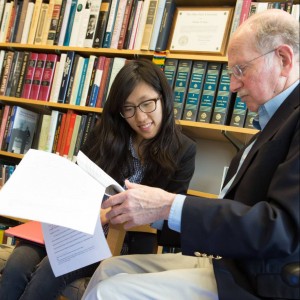At Princeton, ‘finding your way’ can seem as daunting as escaping the Labyrinth. Even when things are going well, I find myself asking thinks like: What are the best courses to take next semester? What should I do next summer? What should I do with my life?

Questions like these don’t have easy answers, and as best as I can tell, we shouldn’t expect to wake up one day with everything figured out. But chipping away at these questions is important, and I’ve found it much easier to do so with some guidance. Where do we get guidance, though?
Enter the mentor. The mentor is your wiser half, your sensei—the person who guides you through this mysterious world with sage advice and unflagging support.
Allow me to gush, for a moment, about one of my own mentors. He’s an older man, a former Politics preceptor of mine, with white hair and the slightly wild-eyed countenance of a highly caffeinated writer. Last Spring, I went out on a limb and visited his office hours pretty regularly, even though we weren’t close. As he got to know me, he started suggesting books, and eventually, campus groups to check out (like the James Madison Program, which I have since joined). When the semester ended, our conversations did not; we emailed over the summer, and made plans to resume our chats in September.
Now, every week or so, we get together and engage in free-flowing dialogues about pretty much anything—last time, we talked about 19th century psychologists, the Supreme Court, and Hinduism. He encouraged me to apply for a fellowship, I did, and now I’m going to India over winter break. I also tell him about my personal relationships and overall well being, knowing that he’ll respond thoughtfully. Suffice to say, I am incredibly grateful to have someone like this in my life.
If you’re reading this and thinking, “This mentor sounds great, Shanon, but I don’t have someone like that at Princeton,” you are not alone; it’s normal to not have found a mentor on campus yet. Take solace in knowing that mentorship opportunities with faculty are built into the latter years of the Princeton experience, in the form of independent work and departmental advisers.
Moreover, while there is no magic formula for beginning a research or mentor relationship, there are countless opportunities at Princeton to put yourself in situations that can lead to such relationships. The “Resources for Researchers” tab of the PCUR Blog is a great place to start looking for these opportunities. Of note on this page are two linked articles by former PCURs Vidushi and Dylan discussing the fine art of cold emailing faculty. Additionally, my PCUR predecessors wrote a series of posts several years ago about Mentorship in Research, which can be found here. Finally, you might consider checking out my fellow PCUR Rafi’s forthcoming post on ReMatch, a program designed to match first-year undergrads and sophomores with graduate student mentors.
At the risk of sounding cliché, I’ll add a final, broad bit of advice on finding meaningful academic connections: take some risks. Introduce yourself after precept, drop by office hours, send that cold email. I know, I know, it can be awkward. We might say the wrong thing. The connection might not pan out—an all too familiar feeling for anyone who has dated before.
But we might also get lucky. So, really, what do you have to lose?
— Shanon FitzGerald, Social Sciences Correspondent

